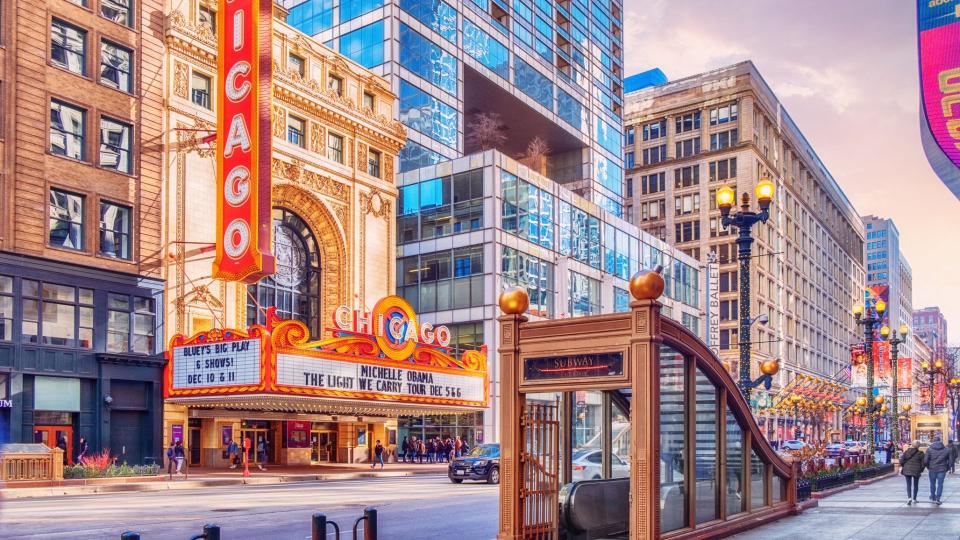Chicago’s Average Cost of Living Is $40,000 a Year — Here’s Why

Chicago may be the third-largest city in the U.S., but it isn’t among the three most expensive. A GOBankingRates survey calculated the cost of living in the 50 largest U.S. states and ranked Chicago at No. 28, with an average annual cost of $40,179. That’s considerably lower than the $104,729 average you need to live in the survey’s most expensive city, San Francisco, but it’s still a good amount of money.
Find Out: Here’s the Living Wage a Single Person Needs To Live Comfortably in Arizona
Learn More: 3 Genius Things All Wealthy People Do With Their Money
Here’s why living in Chicago costs around $40,000 a year.
Wealthy people know the best money secrets. Learn how to copy them.
A Quick Overview of the Annual Cost of Living in Chicago
Per the GOBankingRates survey, this is the average Chicagoan’s annual budget for primary living expenses. Some of these expenses align with the national averages, but you’ll pay more than the average for housing if you move to the Windy City. Below, you’ll find more about each cost category and a little insight into Chicago life:
Groceries: $5,543
Healthcare: $5,148
Housing: $14,478
Utilities: $4,221
Transportation: $9,722
Miscellaneous: $1,067
Total annual expenditures: $40,179
Explore More: The 50 Happiest States in America and How Much It Costs to Live There
Grocery Costs in Chicago: $5,543
Chicagoans spend roughly 12.6% of their budget on groceries. According to Payscale, Chicago’s grocery prices are 5% higher than the national average. Thankfully, groceries are one of the budget categories where there are numerous ways to save.
But higher grocery prices aren’t the only food costs that may eat up your budget in Chicago. The city’s 7,300 restaurants can make it easy to overspend on dining out and ordering in as well.
Healthcare Costs in Chicago: $5,148
Consumer expenditure data from the U.S. Bureau of Labor Statistics shows that Chicago’s healthcare costs are in line with the national average. Additionally, Illinois received a Health Care Affordability ranking of No. 31 from U.S. News & World Report. While not the best ranking, it is pretty close to the middle of the pack, so you likely won’t be overspending too much here.
Housing Costs in Chicago: $14,478
Housing seems expensive everywhere, but Chicagoans dedicate more of their monthly budget to housing than the U.S. average. According to RentCafe, Chicago housing, whether you rent or own, is 38% higher than the national average.
If you prefer an apartment, the average rent in Chicago is $1,476 for a studio dwelling and $2,800 for a three-bedroom apartment. The median monthly mortgage payment for homeowners is $2,105.
Utility Costs in Chicago: $4,221
The average Chicagoan’s electric bill is $170 monthly, 17% below the national average. However, Payscale data shows that Chicagoans pay only 3% less than the national average across all utilities. So higher water and other utility costs may offset the city’s lower electricity costs.
Transportation Costs in Chicago: $9,722
Chicago has the nation’s second-largest public transportation system, so residents can move throughout the city without a vehicle, for a price. If you don’t want to pay for a cab or ride-share, a 30-day unlimited Chicago Transit Authority pass is $75.
For car owners, metered on-street parking can cost as much as $6.50 an hour. Parking in a garage or lot can cost $8 to $25, or you can purchase a parking pass. A one-month parking pass for a ParkChicago lot or garage costs $43.60 to $119.
Of course, parking costs are in addition to the other expenses associated with car ownership. Payscale says gas prices in Chicago are 27% higher than the national average. If you really want to save, ride a bike. Chicago has the second-highest percentage of bike commuters in the U.S.
Miscellaneous Costs in Chicago: $1,067
The most considerable miscellaneous expense for Chicagoans might be entertainment. Entertainment options are numerous, and some are costly. The city boasts eight major league sports teams, more than 200 theaters, 250-plus live music venues, 60-plus museums and 160-plus breweries.
Considering the other expenses that make up the miscellaneous budget category, such as personal care and clothing, it may seem surprising that the average annual cost isn’t higher. However, the city also provides plenty of free entertainment, from the Lincoln Park Zoo to its 29 beaches and 600 parks.
It Costs Over $40,000 a Year To Live in Chicago
On average, you’ll need a take-home pay of at least $41,000 to cover your primary expenses in Chicago, so the average U.S. salary of $63,795 is enough for Windy City living. However, depending on your household’s size and other circumstances, your expenses could be considerably higher.
If you can find ways to keep your housing and transportation costs in check — the two most significant budget items for the average Chicagoan — you may discover that Chicago has a lot to offer in terms of fun and affordability.
More From GOBankingRates
I'm a Real Estate Agent: These 5 Florida Cities Are Becoming Unaffordable
These 10 Used Cars Will Last Longer Than an Average New Vehicle
6 Things to Try This Week if You're Behind on Your Savings Goals
4 Reasons Retired Women Need More Money Than Men -- And What To Do About it
This article originally appeared on GOBankingRates.com: Chicago’s Average Cost of Living Is $40,000 a Year — Here’s Why

 Yahoo Finance
Yahoo Finance 